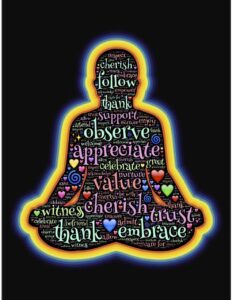An Editorial by Sheila Ferguson
In this New Year, I plan to learn how to meditate. I have noticed that those who practice daily mindfulness meditation appear cool, calm, and collected in a variety of stressful situations. In this fast-paced world filled with distress, we are at risk of falling into a downward spiral of information overload, worry, depression, and panic.
Stressful thoughts and situations rob us of our joy and ability to look on the bright side of things. It seems that those who meditate daily regain health and the ability to interrupt the cycle of negative thoughts. Overall, researchers suggest that mindfulness meditation is one way to keep one’s mind, body, and spirit in good form.
According to PubMed, the U.S. National Library of Medicine’s database of biomedical papers, there are more than 8,000 articles on the positive and rejuvenating effects of mindfulness meditation. By definition, “Meditation is a mind-quieting and contemplative practice, drawn from Buddhist traditions. Today it has been adapted for application in Western society. It is a broad set of practices that seek to use the mind to attain rest, relaxation and clarity.”

A 2014 meta-review of 21 neuro-imaging studies of 300 meditation practitioners found that eight regions of the brain are positively impacted by daily meditative practice. Key findings suggest that meditation enhances the brain’s capacity for meta-awareness, introspection, body awareness, memory, self-regulation, and emotional regulation. It also strengthens communication between the left and right hemispheres of the brain. These findings match up with other brain studies, clinical/behavioral research, and documented individual experiences.
Bill Nash has been meditating since the 1990s. Thirty years ago a near-fatal diagnosis of hypertension almost ended his life. Bill says, “I was thirty-five and working two jobs to make ends meet. My blood was so high that my doctor hospitalized me. During those two weeks of bed rest and observation, I was sent to the hospital’s Biofeedback Unit, which is where my long-term recovery and self-help began. There I was educated on self-monitoring, which saved my life.” According to Bill, his daily meditation decreased his blood pressure.

Five years ago, Chelsea Fields, a bubbly and talkative college sophomore, suffered from crippling bouts of anxiety. This highly exact political science major would falter and cry as she prepared for her solo and group presentations. The breaking point came when she passed out while giving a presentation. She recalls walking up to the podium, waking up in the hospital, and learning that she was suffering from a panic disorder.
Chelsea’s anxiety presented as feelings of impending doom, shortness of breath, chest pain, and a rapid, fluttering, and pounding heart (heart palpitations). These panic attacks led to a cycle of constant worry and avoidance. Her recovery included the short-term use of prescribed medication and weekly therapy visits. Looking back, she credits her recovery to her self-help assignment to attend “mindfulness meditation” classes at the hospital’s holistic health center. Today Chelsea practices daily and is a certified meditation trainer.
But do not just take Bill and Chelsea’s testimony. Dr. Dawson Church, the author of “Mind to Matter” reports that meditation can improve the state of your brain. Dr. Church suggests that one of the biggest boosts that comes from mindfulness meditation is a “renewed brain” and the capacity for self-regulation. He also states that people who meditate can claim victory over many stressful life events.

Overall, mindfulness meditation greatly improves physical and mental health. “It also offers you the ability to concentrate and calm the mind while naturally increasing a sense of compassion. Foremost it allows for the experiences of:
• Centeredness;
• Improved emotional balance and mental health.
• Positive well-being.
• Calmness and reduced stress.
• Decreased blood pressure; and lower heart rate.
• Increased mental focus; and
• Improved sleep.
Today there are lots of ways to get started. One of the easiest ways is to tune in online to the Calm Together website titled: Let’s look after ourselves, and each other. Calm Blog features the Calm Global Mediation Event and the Calm collection below:
Soothing Meditations; Sleep Meditations and Stories; Calm Music, The Calm Master Class; Calm Kids, The Calm Master Class , Practices to Find Ease and the Mindfulness Resources.
Other online resources include Chopra Meditation at Chopra.com and the Chopra Meditation Certification Program, Mindworks: Authentic Meditation Courses to Transform Your Life. YouTube also features several practical trainings.
If you would like to meditate with a community, you can find classes and sessions across Eastside and Westside Cleveland. Some of the best include:
• Heartfulness Meditation Center – Home | heartfulnessmeditationcleveland.org Ohio, 5425 Warner Road, Garfield Heights, Ohio 441125. Group Meditations – Sundays 9 am EST at the Urban Community School 4909 Lorain Ave. Cleveland, OH 44102
- Songtsen Gampo Buddhist Center – (216) 471-8840; 14023 Madison Ave. Lakewood, OH 44107
• Selfspace Meditation Studio – (213) 880-2631; 2026 Murray Hill Rd Ste. 208 Cleveland, OH 44106
• The Balanced Living Center– (440) 941-0425; 16600 Sprague Rd Ste. 90 Middleburg Heights, OH 44130
• Shambhala Meditation Center of Cleveland – (216) 236-5090; 17309 Madison Ave. Lakewood, OH 44107
I am looking forward to getting started with my Meditative Practice; and I wish you, my neighbors across Greater Cleveland, the blessings of peace and calm in this New Year!





